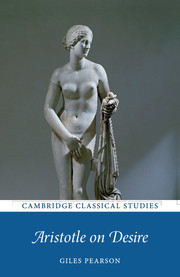Description
Aristotle on Desire
Cambridge Classical Studies Series
Author: Pearson Giles
This book reconstructs Aristotle's account of desire from his various scattered remarks. It will be relevant to anyone interested in Aristotle's ethics or psychology.
Language: English
Subject for Aristotle on Desire:
Approximative price 30.28 €
In Print (Delivery period: 14 days).
Add to cart
Aristotle on Desire
Publication date: 09-2016
Support: Print on demand
Publication date: 09-2016
Support: Print on demand
Approximative price 103.04 €
In Print (Delivery period: 14 days).
Add to cart
Aristotle on desire
Publication date: 08-2012
288 p. · 14.4x22.2 cm · Hardback
Publication date: 08-2012
288 p. · 14.4x22.2 cm · Hardback
Description
/li>Contents
/li>Biography
/li>
Desire is a central concept in Aristotle's ethical and psychological works, but he does not provide us with a systematic treatment of the notion itself. This book reconstructs the account of desire latent in his various scattered remarks on the subject and analyses its role in his moral psychology. Topics include: the range of states that Aristotle counts as desires (orexeis); objects of desire (orekta) and the relation between desires and envisaging prospects; desire and the good; Aristotle's three species of desire: epithumia (pleasure-based desire), thumos (retaliatory desire) and boulêsis (good-based desire - in a narrower notion of 'good' than that which connects desire more generally to the good); Aristotle's division of desires into rational and non-rational; Aristotle and some current views on desire; and the role of desire in Aristotle's moral psychology. The book will be of relevance to anyone interested in Aristotle's ethics or psychology.
Introduction; Part I. Desires and Objects of Desire: 1. The range of states Aristotle counts as desires (orexeis); 2. Some general considerations about objects of desire (orekta) for Aristotle; 3. Desire (orexis) and the good; Part II. Aristotle's Classifications of Desire: 4. Species of desire I: epithumia (pleasure-based desire); 5. Species of desire II: thumos (retaliatory desire); 6. Species of desire III: boulêsis (good-based desire); 7. Rational and non-rational desire; Part III. Further Reflections: 8. Some reflections about Aristotle's broad and narrow notions of desire; 9. Aristotle's moral psychology.
Giles Pearson is a lecturer in philosophy at Bristol University. He has published a number of articles on Aristotle's ethics and philosophical psychology and is co-editor of Moral Psychology and Human Action in Aristotle (with Michael Pakaluk, 2011).
© 2024 LAVOISIER S.A.S.
These books may interest you

The Virtues of Aristotle 45.15 €

The Virtues of Aristotle 142.04 €

Aristotle on Thought and Feeling 102.80 €

